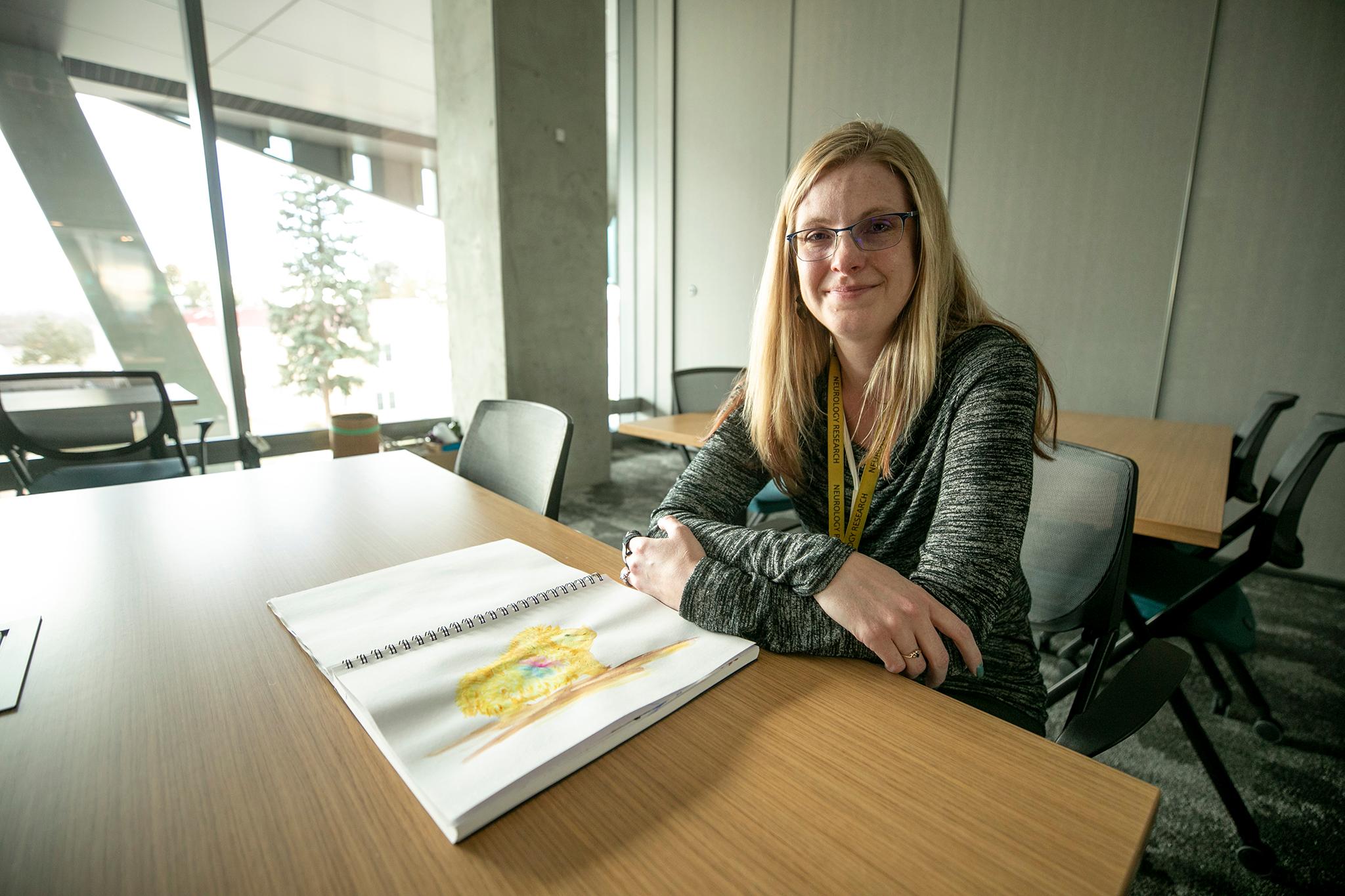Brianna Blume still thinks about the first patient who died in her care. It was about seven years ago. The woman was very sick, and she had enrolled in a clinical trial for a drug that could have saved her.
"She had a fatal disease, and it claimed her life," Blume remembered. "The kicker is that she was in the study where the drug worked, and she was on placebo."
Control groups are part of science; you need some baseline to know the thing you're testing actually works, so it's normal that the process leaves people behind. Still, the woman has remained in Blume's mind all these years later.
The episode represents one of a thousand tiny cuts that have chipped away at her energy and peace of mind as she pursues a career she otherwise loves.
She's not alone, a recent poll found two-thirds of doctors and nurses are struggling with burnout.
To help process those pressures, Blume enrolled in an art therapy group that meets on the Anschutz Medical Campus in Aurora, where she works. A few weeks ago, art therapist Katherine Reed asked the group to draw something that represented vulnerability. Blume chose a simple dollar-store toy that that first patient gave her.
"She was just a really lovely woman, and she was doing such a favor to us, as researchers, by being in this study. And here she was giving us gifts," she said, tearing up. "She was not only my first patient to pass away, I was in the room with her when we withdrew care. So the little thing sits on my desk now."
As she drew the little yellow toy on the page, it became part of Blume's own treatment. And as a participant in the 12-week program, she's become a part of a broader research study herself.
Reed has run art therapy classes through Children's Hospital Colorado's Ponzio Creative Arts Therapy Program for almost 20 years. Blume's cohort represents only the second time her work to tackle trauma, depression and post-traumatic stress disorder among medical workers has been evaluated quantitatively. The results so far suggest pairing group therapy with dancing, writing, painting or playing music could be as powerful as an antidepressant.
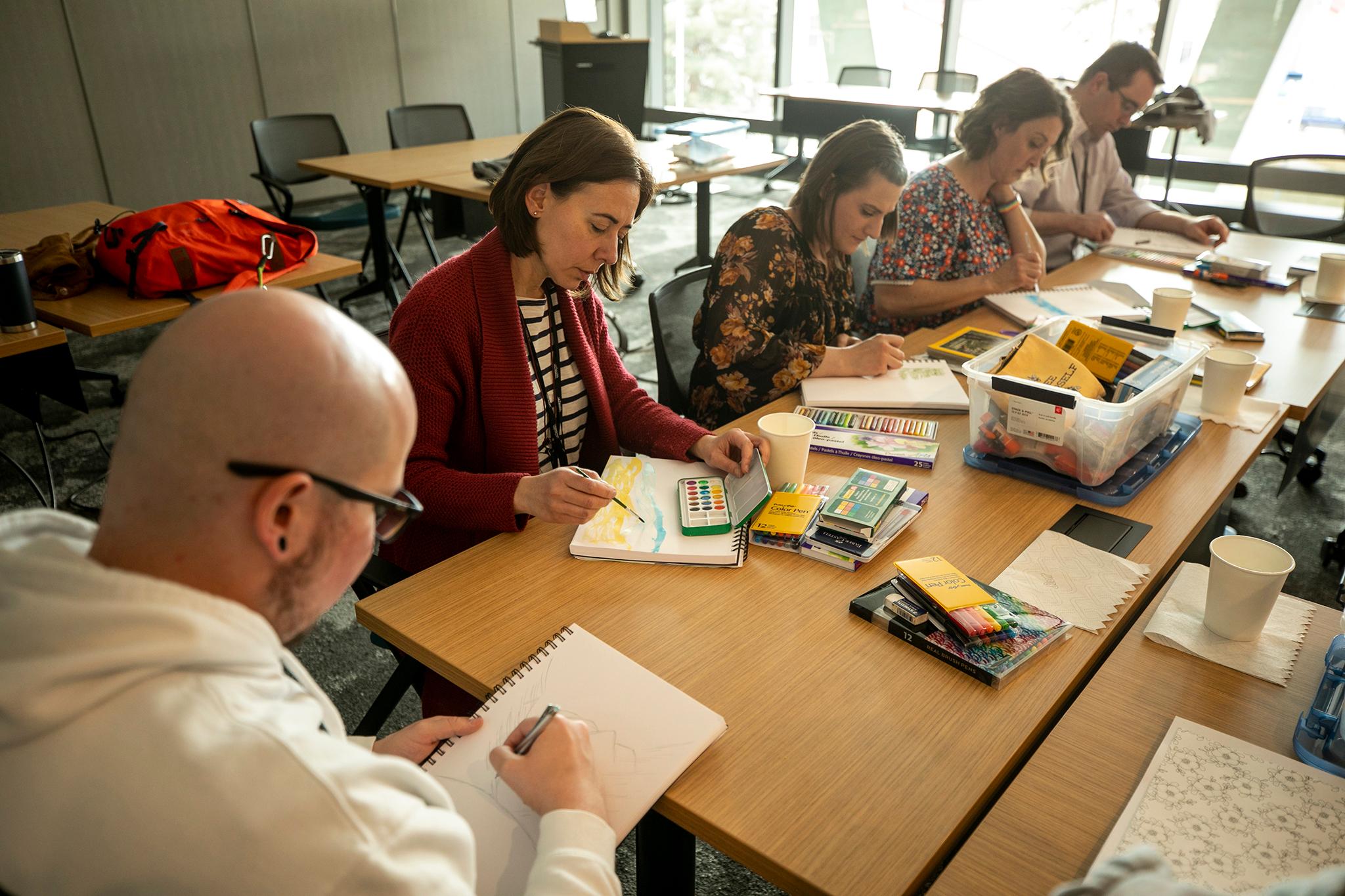
The budding research was made possible by an unlikely collaboration between hospital researchers and a writers workshop.
Michael Henry co-founded Denver's Lighthouse Writers Workshop in 1997, where he's spent the last 25 years helping people put their thoughts onto a page.
The nonprofit has long offered classes as therapy to people in the criminal justice system and in city homeless shelters. Henry said he always knew writing could help ease people's minds, but he could never prove it. Then a few years ago, a colleague alerted him to an unexpected cold call.
"'There's a guy on the line. He says he is a doctor and he's interested in partnering on an NEA-funded study,'" Henry remembered. "And I said, 'Who? That sounds cool. Why don't you to patch him through?'"
It was Dr. Marc Moss on the line. He's a pulmonary critical care doctor, but he began studying burnout among medical professionals as a side project in the early 2000s, attempting to shed light on what he describes as a systemic and "silent epidemic of psychological distress." His research mostly focused on the impacts of working in a hospital, but a grant listed by the National Endowment for the Arts gave him an opportunity to study solutions.
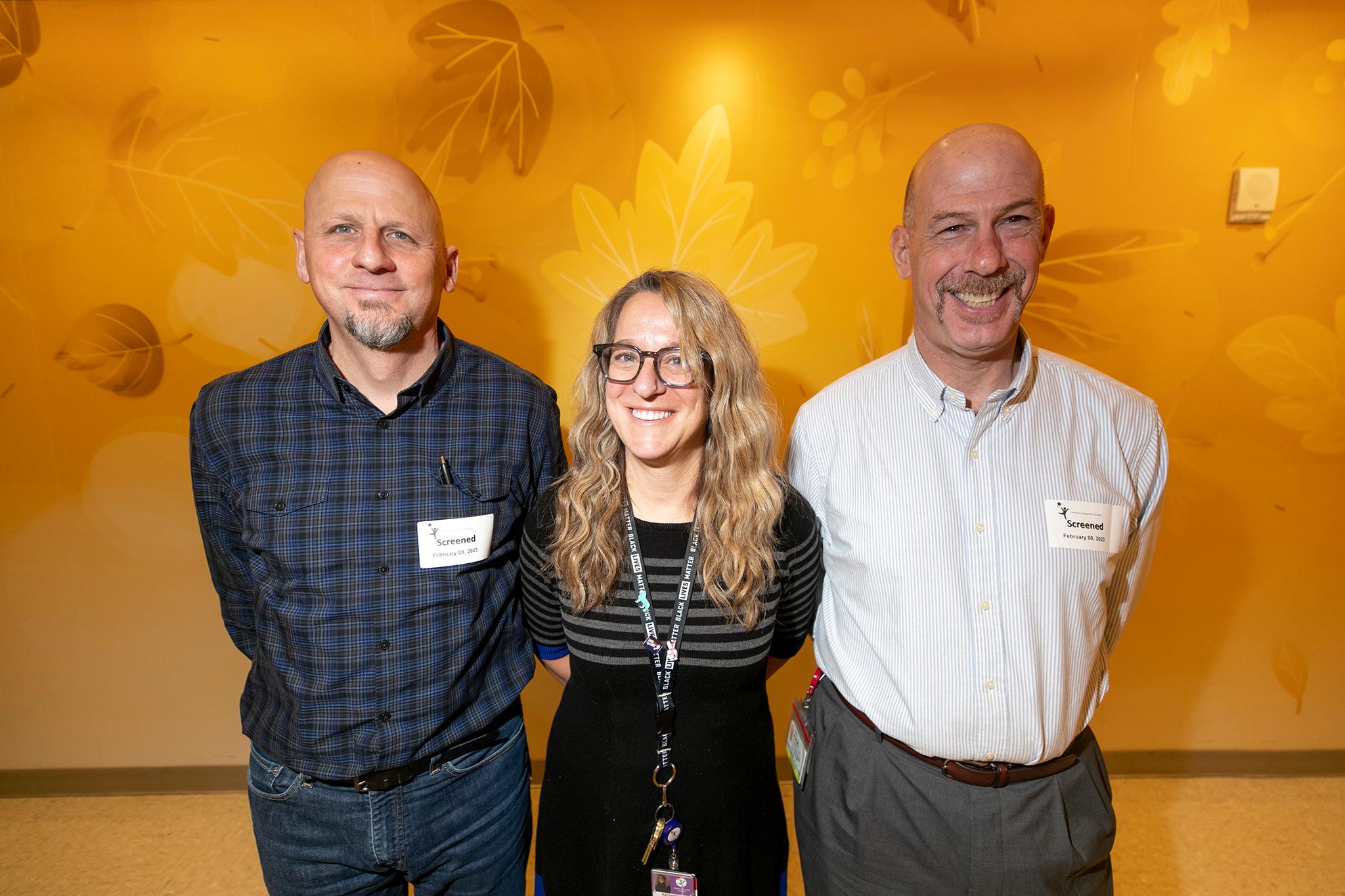
To get the money, Moss needed to partner with two arts organizations. One of his colleagues pointed him to Reed, who'd managed Ponzio Creative Arts Therapy since 2005 and slowly, informally, began treating doctors and nurses who came to her for an outlet. Another pointed him to Lighthouse, which had never done something like this before; Henry was immediately interested.
"Anecdotally, we've known for a long time of the positive benefits that individuals have when they're able to meet in community and share their stories with one another," he said. "Participating in a research study to actually get data was really, really appealing."
Together, they wrote a proposal and won the NEA grant and founded the Colorado Resiliency Arts Lab, or CORAL, and got to work organizing a randomized clinical trial.
Here's "12 Hours," an anthology of work by CORAL's Fall 2020 writing cohort:
That first study revealed art therapy's ability to ease trauma.
Over 15o people were placed into five groups: four that focused on writing, dance, visual arts and music, and one control group. Each participant filled out a psychological survey at the beginning and end of the 12-week program, including people in the control who did nothing during the study period. Then Moss' team followed participants for an additional year to see if the interventions stuck.
The results, which were published last September in the American Journal of Medicine, suggest people who received arts therapy saw an 27 percent drop in anxiety, a 35 percent drop in depression, a 25 percent drop in "total PTSD" and an 11 percent drop in "emotional exhaustion." Outcomes were similar across all four art disciplines.
"What someone said is, if this was a drug, you'd be going to FDA to try to get it approved," Moss said.
Reed said she may have been the person who said that, adding, "It's really significant. In other behavioral health research studies, they're not seeing numbers like that."
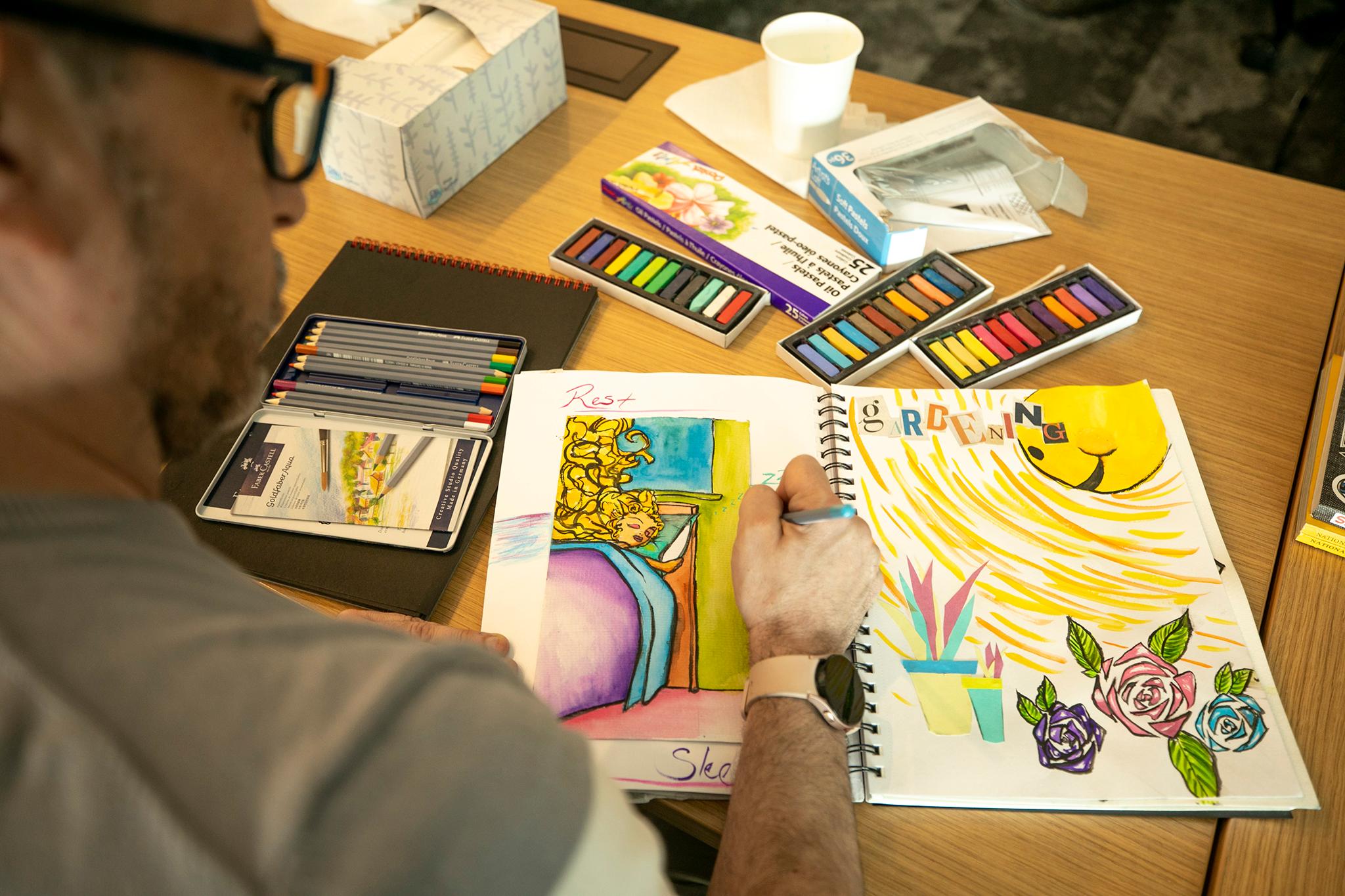
The check-ins throughout the year surprised them even more.
"Even though the intervention had ended, there were continual significant improvements compared to the control group in symptoms of anxiety and depression," Moss said. "We have to do a more definitive study, et cetera, but that it lasted for 12 months -- that's unprecedented."
The cohort that includes researcher Brianna Blume is one of their next steps to confirm their findings. In future studies, Moss said they may ask control groups to meet during the 12 weeks without an art class to prove it's the combination of group therapy with creative practice that holds so much power.
Here's "Through our eyes," an anthology of work by CORAL's Spring 2020 visual arts cohort:
Whatever comes next, the CORAL team says their work has already proven interventions like these are worth funding.
Reed began a visual arts session last week as she always does: with a check-in where participants weigh in with their best and worst moments since they last met.
Most people said their recent low points were exhaustion, stress and the regular grind that brought them here. When it was Blume's turn to speak, she said her high point was a little moment of magic. The cheap-o toy she'd kept on her desk for seven years had a light within it that hadn't worked in a very long time.
"It lit up," she told the group, beaming. "It was definitely a good way to start the day."
While Blume said COVID increased public awareness of burnout plaguing hospital workers, it's been a topic of discussion in her world for a long time. In January 2020, just before the virus was discovered in the U.S., she and a colleague attended a talk titled "Yoga Isn't Helpful When The Building's On Fire."
"I think the pandemic just made it abundantly clear, but it was there before. You know, the job's demanding," she said. "It's rare to find somebody who doesn't care too much, and we all struggle to protect ourselves."
Halfway through the study period, she's felt some of that pressure begin to drop. She said she's enjoyed the artistic practice, something she did a lot of back in high school, but it doesn't mean it's been easy.
"It's art therapy, but it is therapy and therapy's a lot of work. Parts of it are really hard, having to sit with emotions and feelings and things that I mostly have compartmentalized to keep doing my job," she said. "It's not fun coming back to those feelings, but I think it's helpful."
Sitting with feelings may be uncomfortable, but Reed said it's a preferable side-effect compared to those associated with drugs.
"People are leaving the profession because of how hard it is, and this is something that works, that's affordable, that's feasible and that could happen in your hospital," she said. "The risks are low. The costs are low."
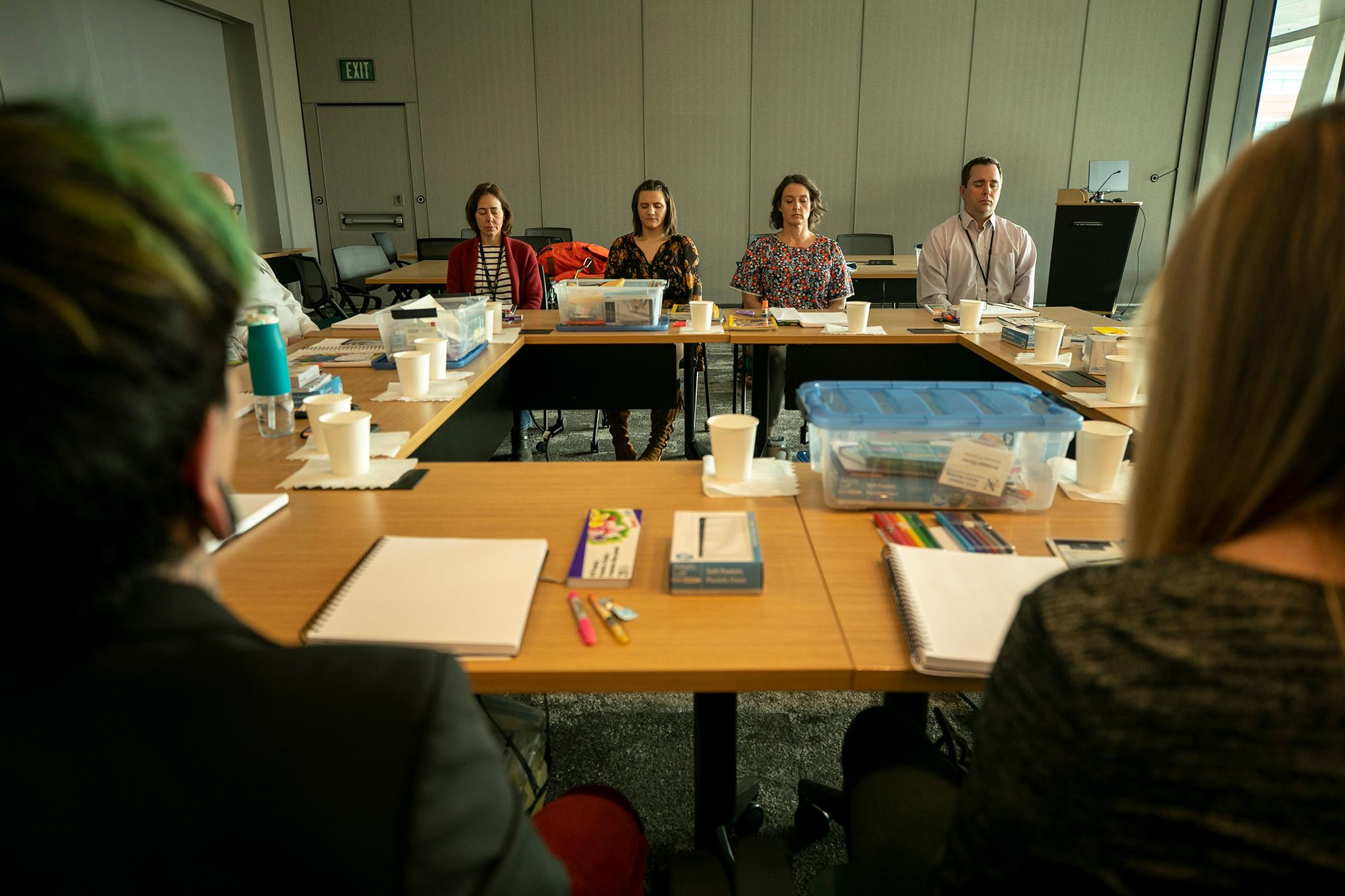
As they got ready to draw last week, Reed told her group the session would be about grounding themselves in images that give them peace. It would be a crucial step towards the climax of their treatment; In the next session, they would dive headfirst into the things that cause them stress, anxiety and grief.
"Close your eyes," she said as the room grew silent. "I want you to move to your very favorite space, outdoors, that you've ever been."
What does it smell like? What does it sound like? How does it feel?
"Really take in the visual experience. Is it bright? Is it night?" she said quietly, then: "Open your eyes. Find your art supplies and create that place on your page."
You can see more work from CORAL cohorts on their website.
This story has been updated to clarify Katherine Reed's role as manager of the Ponzio Creative Arts Therapy Program.

